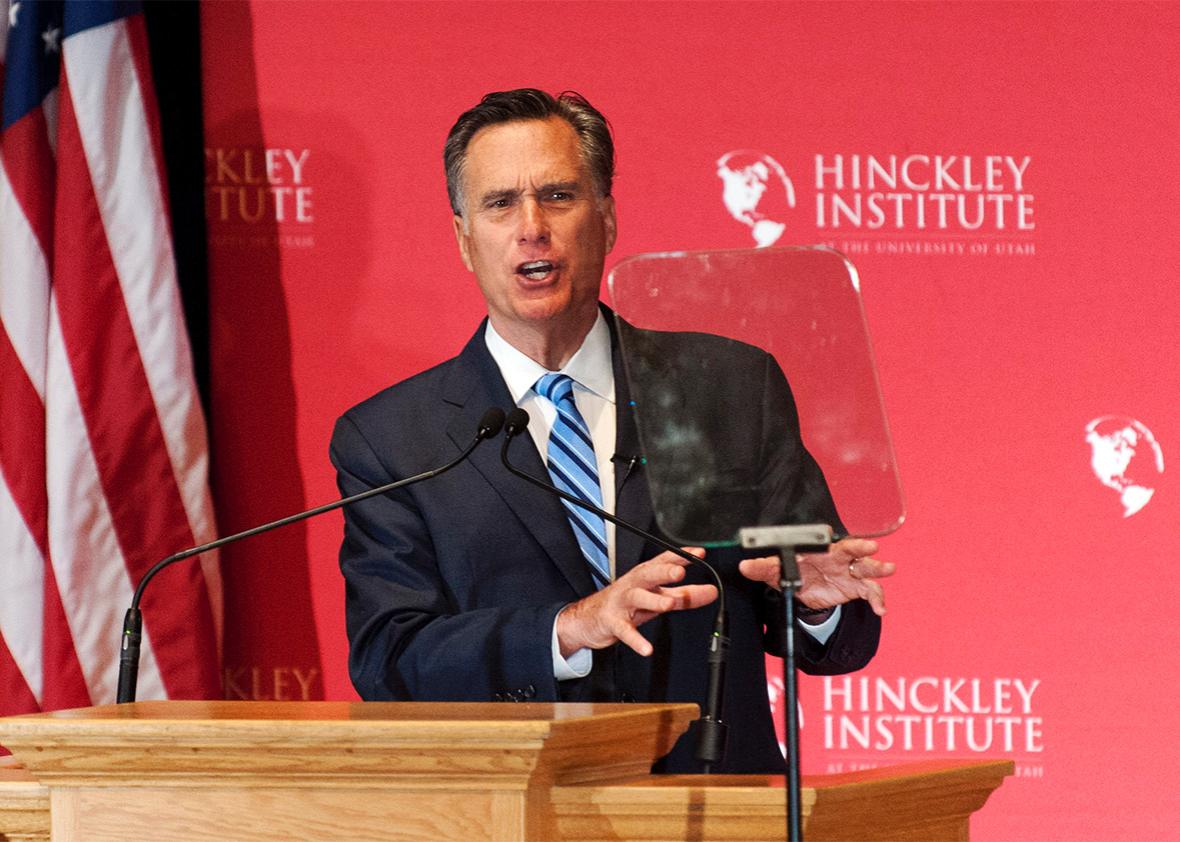Mitt Romney, of 2012 fame, is making good on his support for the “everyone stays in” tactical voting strategy in which anti-Trumpists do not coalesce around a single non-Trump candidate, but rather support whichever candidate can pluck the most delegates from Trump in any given state. He has recorded a message for the John Kasich campaign in Michigan that, unconventionally enough, doesn’t express direct support for John Kasich. That may be because he also recorded a robocall for the Marco Rubio campaign in Michigan. The twin goals, theoretically, would be to vault Kasich past Trump for the gold medal in Michigan while helping Rubio cross the 15 percent threshold for collecting delegates. (Right now, Marco Rubio is in fourth place in the state.) Romney also recorded robocalls for Rubio in the remaining Tuesday voting states of Idaho, Hawaii, and Mississippi. Huh.
To put it generously, it’s not clear that Romney’s attempt to siphon delegates from Trump is moving the masses. If anything, his speech last week seemed to encourage more voters to back Trump. Romney should be credited for speaking his conscience, even if doing so only reinforces the prevailing anti-establishment mood of the cycle. But can we be so sure that speaking his conscience—and standing up for the supposed dignity of the pre-Trump Republican Party—is really all that he is doing?
Romney appeared on Meet the Press this weekend to talk about how horrible a human being Trump—one of Romney’s most high-profile endorsers in 2012—is. He explained that he would support Rubio, Kasich, or even Ted Cruz over Trump. As a final question, moderator Chuck Todd asked him if he would accept the nomination at a deadlocked convention in Cleveland if drafted.
CHUCK TODD: You told Matt Lauer, my colleague on Friday, that you would not be a candidate for president. But let me ask you the way General Sherman was once asked, “If nominated, will you accept the nomination?” If your name is placed in the nomination, and was elected at this Cleveland convention, would you accept it?
MITT ROMNEY: You know, I can’t imagine anything like that happening. And I don’t think anyone in our party should say, “Oh no, even if the people in the party wanted me to be the president I would say no to it.” No one’s going to say that. But I can tell you this, I’m not a candidate, I’m not going to be a candidate, I’m going to be endorsing one of the people who’s running for president.
Mmhmm. What I hear there is, “You can’t even believe how badly I want the nomination in a deadlocked convention, Chuck Todd. It is, in fact, very much why I’m speaking out like this, jumping back into the mix. Gee golly, I will do literally anything to become president of the United States.”
Romney has always been careful never to fully shut the door on the job he wants. It was an extraordinary thing for him to even consider jumping into the 2016 presidential race, after having lost in 2012 and in 2008, but he did. He opted not to run, in his words, as a gracious move to give “one of our next generation of Republican leaders” an opportunity to carry the party mantle. (The more likely reason he didn’t run was simply that Jeb Bush boxed him out.) His statement announcing his decision not to run, though, left the door ajar. Emphasis ours:
I’ve been asked, and will certainly be asked again if there are any circumstances whatsoever that might develop that could change my mind. That seems unlikely. Accordingly, I’m not organizing a PAC or taking donations; I’m not hiring a campaign team.
No, I don’t think Romney is going to be the Republican presidential nominee. That seems unlikely, as the man once said. But he and other “establishment” leaders who are giddily trumpeting their plan to block delegate leader Donald Trump from reaching a majority have—shockingly—misread how this looks to the grassroots. Rank-and-file conservatives, even the ones who believe Donald Trump is a fraud who’s hijacked their movement, find the prospect of blocking Trump for the express purpose of putting an establishment candidate on the ticket in Cleveland to be the ultimate sin. If there’s nothing in this for Romney, he should say so, explicitly. Otherwise he merely serves as the avatar of establishment conspiracy.
Read more Slate coverage of the GOP primary.
